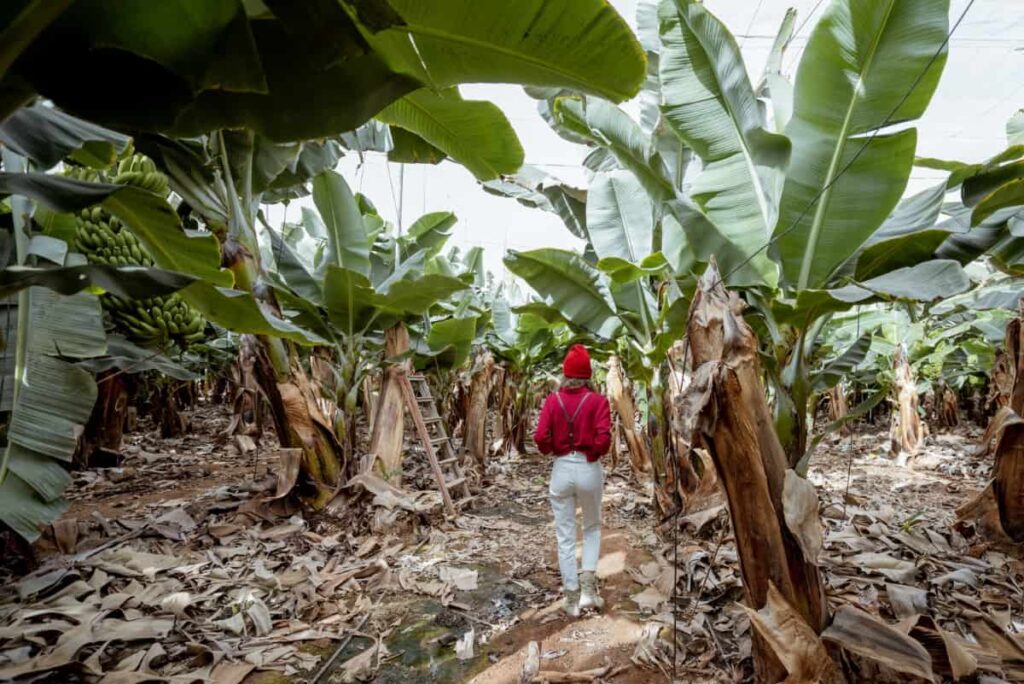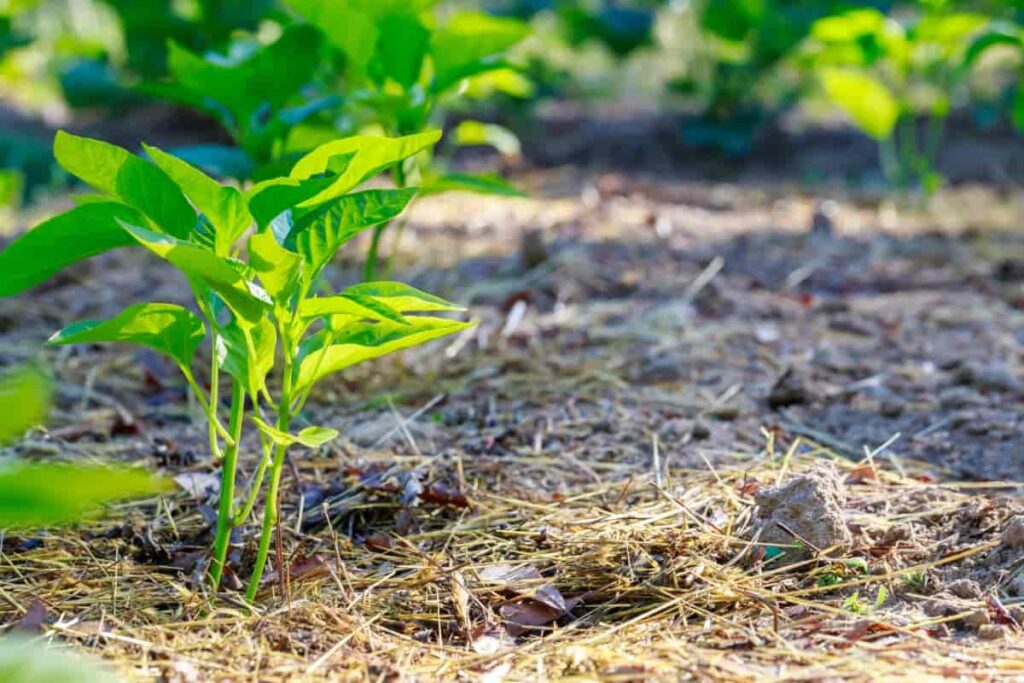Discover the transformative potential of utilizing banana trees as mulch for optimal plant and crop growth. By repurposing banana plants as mulch, you not only enhance soil health but also promote sustainable gardening practices. This organic mulch, rich in essential nutrients, fosters water retention, mitigates weed growth and fosters overall soil health.

Learn how to create banana mulch to enrich your garden beds, improve nutrient uptake, and enhance crop productivity. Embrace this eco-friendly approach to gardening and witness the remarkable benefits of integrating banana tree mulch into your cultivation regimen.
Banana Trees as Mulch
Introduction to Banana Tree Mulching
Banana tree mulching is a practice of using banana plants as a source of organic matter for improving soil fertility and health. Banana plants are fast-growing and produce large amounts of biomass that can be used as mulch for plants and crops. Mulching is the process of covering the top soil surface with organic or inorganic materials to conserve moisture, suppress weeds, moderate temperature, and enhance soil quality.
Benefits of Using Banana Trees as Mulch
Banana tree mulch offers numerous benefits for plants and crops. It provides essential nutrients like potassium, phosphorus, calcium, and magnesium, which are released into the soil as it decomposes. This decomposition improves soil structure by increasing organic matter content, water-holding capacity, porosity, and aggregation, enhancing aeration, drainage, and root penetration.
It also supports soil biological activity by providing food and habitat for beneficial microorganisms like bacteria, fungi, earthworms, and insects, which help decompose organic matter, recycle nutrients, suppress pathogens, and improve soil health.
Decomposition Process
Various factors, including moisture, temperature, oxygen, and particle size, influence the decomposition of banana tree mulch. Moisture is crucial for microbial activity and decomposition, with an optimal level of 50-60%. Temperature affects the rate and extent of decomposition, with higher temperatures increasing microbial activity and lower temperatures inhibiting it.
Oxygen is required for aerobic decomposition, which is faster and more efficient than anaerobic decomposition, producing carbon dioxide and water. To ensure adequate oxygen supply, banana tree mulch should be loose and well-aerated. Particle size also affects the surface area and accessibility of organic matter to microorganisms. To increase the decomposition rate, banana tree mulch should be shredded or cut into smaller pieces.
Preparing Banana Tree Mulch
- Harvest banana plant material from various parts of the plant, such as leaves, pseudostems, suckers, flower stalks, and fruit peels.
- Harvest the material after fruiting or before flowering to accumulate enough biomass and nutrients.
- Shred or cut the material into smaller pieces for easier decomposition, either manually or mechanically.
The ideal particle size for banana tree mulch is 2-5 cm in length and 0.5-1 cm in width. Banana tree mulch has a high nutritional content compared to other mulches, with an average nutrient content of 2.3% nitrogen, 0.4% phosphorus, 3.7% potassium, 1.2% calcium, 0.6% magnesium, and 0.1% iron. This makes it an effective and nutritious mulch for your garden.
In case you missed it: Thai Banana Cultivation: Varieties, How to Grow, Buy and Eat Them

Application Techniques for Banana Tree Mulch
Banana tree mulch can be applied using various techniques, depending on the crop type, available mulch, and desired effect. Common methods include surface mulching, which conserves soil moisture, suppresses weeds, moderates soil temperature, and provides nutrients. Incorporation, which mixes mulch with topsoil or is incorporated into planting holes, improves soil structure, enhances soil biology, and increases nutrient availability.
Composting, which involves combining mulch with organic materials like animal manure, kitchen waste, or crop residues, stabilizes organic matter, reduces pathogens and pests, and produces a high-quality fertilizer.
Water Retention and Soil Health
Banana tree mulch is a natural method that can enhance soil health and water retention. It creates a physical barrier between the topsoil and the atmosphere, reducing evaporation and preserving soil moisture. It also increases infiltration by breaking the impact of raindrops on the soil surface and creating pores and channels.
It prevents runoff by slowing down water flow and increasing soil roughness, preventing erosion and nutrient leaching. Additionally, banana tree mulch improves soil structure by increasing organic matter content, water-holding capacity, porosity, and aggregation, enhancing aeration, drainage, root penetration, and reducing compaction and erosion.
Weed Suppression Capabilities
Banana tree mulch is a natural method of suppressing weeds by blocking light, smothering weeds with organic matter, and releasing allelopathic substances. The thicker the mulch layer, the more effective it is in blocking light. This method also prevents the growth of other plants, such as barnyard grass, crabgrass, and purslane. Studies have shown that banana plant extracts have allelopathic effects on certain weed species, making them a valuable tool for controlling weed growth.
Pest and Disease Management
Banana tree mulch is a natural method used to manage pests and diseases by providing a habitat for natural enemies like predators, parasitoids, and pathogens. This helps control pest populations by feeding on or infecting them. Banana tree mulch also reduces pest and disease incidence by improving plant health and vigor, making them more resistant to attacks.
It also creates a physical barrier between the plant and the soil, where many pests and diseases originate or overwinter. Additionally, banana tree mulch induces systemic resistance in plants, enhancing their defense against pests and diseases. Studies have shown that banana plant extracts can induce systemic resistance in certain crops.
Compatibility with Different Plant Types
Banana tree mulch is suitable for various plant types, including fruit trees like citrus, mango, avocado, papaya, and guava, vegetables like lettuce, cabbage, spinach, carrot, onion, garlic, and flowers like rose, marigold, sunflower, and daisy. It provides nutrients, improves soil structure, conserves moisture, suppresses weeds, and controls pests and diseases. Overall, banana tree mulch is a versatile and effective solution for maintaining healthy plant growth.
Environmental Benefits of Recycling Banana Plants
Recycling banana plants as mulch offers numerous environmental benefits, including reducing waste, saving resources like water, fertilizer, pesticide, and fuel, and enhancing biodiversity by providing habitat, food for wildlife like birds, insects, and mammals. This not only saves landfill space and reduces greenhouse gas emissions but also minimizes environmental impacts and costs.
Maintenance and Monitoring
Banana trees are valuable organic mulch for plants and crops, providing nutrients, moisture, and protection from weeds and pests. To use them as mulch, cut down the tree after harvesting fruits, chop the trunk and leaves into small pieces, spread them around the base of plants or crops, cover the soil with a thick layer of banana mulch, water it well to decompose, and repeat the process every 6 to 12 months or whenever new bananas are harvested. This method improves plant health and productivity, reduces waste, and saves money.
In case you missed it: Banana Farming Information Guide

Conclusion
Harnessing banana trees as mulch offers a sustainable and effective method to boost plant and crop health. By recycling banana plants into nutrient-rich mulch, gardeners can enhance soil fertility, regulate moisture retention, and suppress weed growth, ultimately fostering thriving and resilient agricultural ecosystems.
- Crops Grown in Summer Season: Best Choices for Summer Gardening
- Organic Pest Control for Tomato Farming
- How to Maximize Sheep Farming Profit
- Broccoli Varieties: Choosing the Right Cultivars for Your Farm
- How to Raise Pigs in Your Own Backyard: A Comprehensive Guide
- Budget Friendly Sheep Shed Ideas: Cheap and Low-Cost Tips
- How Much Do Cattle Farmers Make: Revenue Streams in Cattle Farming
- Management Pests and Diseases in Your Cotton Field
- Sheep Farming Business Plan for Beginners
